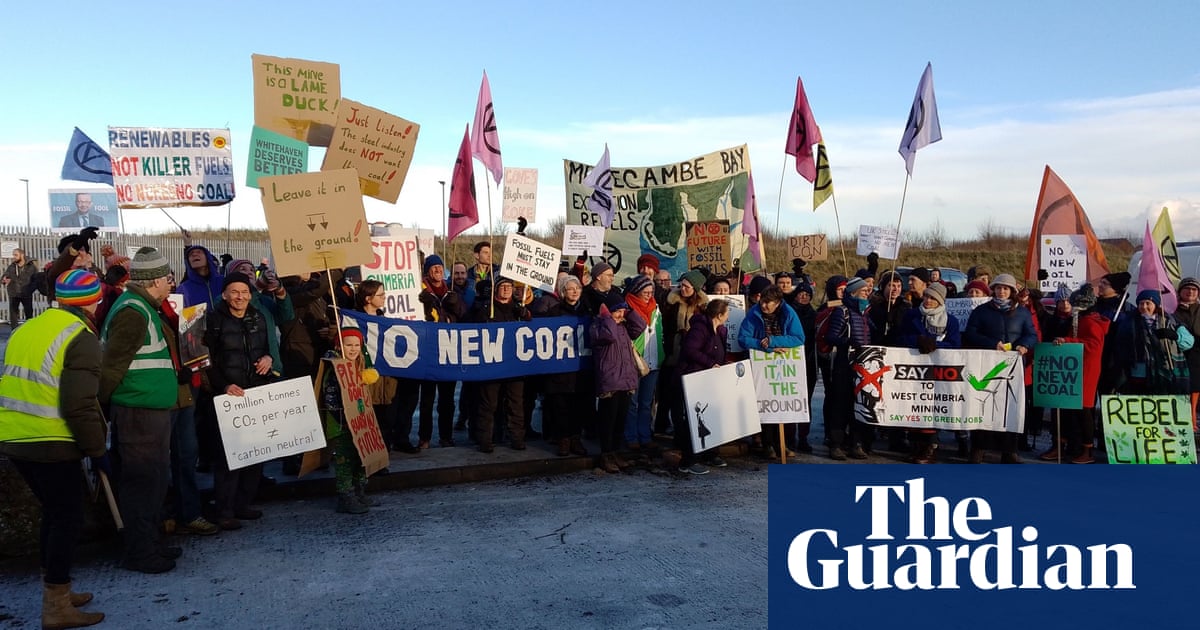
The UK’s first new deep coalmine in 30 years will not be allowed to go ahead after a ruling in the high court.
On Friday morning, Justice Holgate ruled that plans to build the facility in Whitehaven, Cumbria, would not proceed, in what campaigners called a “victory for the environment”.
New fossil fuel projects are thought to be on shakier legal ground after the precedent set by a landmark supreme court decision that quashed planning permission granted for an oil drilling well at Horse Hill on the Weald in Surrey. The judgment found the climate impact of burning coal, oil and gas must be taken into account when deciding whether to approve projects. This was the first court decision on plans for a new fossil fuel development since the Horse Hill ruling.
Holgate agreed with Friends of the Earth that Michael Gove, when he was secretary of state for levelling up, acted unlawfully in accepting a claim by West Cumbria Mining (WCM) that the mine would be “net zero” and have no impact on the country’s ability to meet the emissions cuts required under the Climate Change Act 2008, because it was relying on offsetting through purchasing carbon credits from abroad. UK government policy does not allow for reliance on international offsets to meet carbon budgets.
The new Labour government this year withdrew its support from the Whitehaven mine in the Cumbria legal case. Lawyers acting for Angela Rayner, the secretary of state for housing, communities and local government, said there had been an “error in law” in the decision to grant planning permission for the mine in December 2022.
Withdrawing its defence against two legal challenges by Friends of the Earth and South Lakes Action on Climate Change, the government instead informed the court that the planning permission should be quashed. The case proceeded as the developer of the mine, WCM, still wanted to defend the original decision to approve it.
Emissions from the burning of the coal from the proposed Whitehaven mine were not included in the developer’s climate assessment. The mine’s total lifetime emissions, to come almost entirely from the burning of the coal, were forecast to exceed 220m tonnes of CO2 equivalent, an amount equal to more than half of the UK’s total emissions in 2022.
During the hearing, lawyers acting for Friends of the Earth said that given the decision by the supreme court in the Surrey case, the climate impact of burning coal, oil and gas should have been taken into account when deciding whether to approve the project.
“WCM … failed to quantify or assess the downstream combustion emissions from the coal extracted from the mine,” they submitted.
Niall Toru, a senior lawyer at Friends of the Earth, said: “This is fantastic news and a huge victory for our environment and everyone who has fought against this climate-damaging and completely unnecessary coalmine. It is the first fossil fuel case to be decided after the landmark Supreme Court judgment on oil drilling at Horse Hill. That the ruling today has gone against the mining company could have ramifications internationally, as there are cases abroad where challenges are being made against fossil fuel projects on a very similar basis.
“This mine should never have been given permission in the first place. The case against it is overwhelming: it would have huge climate impacts, its coal isn’t needed and it harms the UK’s international reputation on climate.”
The ruling means Rayner will now have to reconsider the planning application – taking into account its full climate impact. In doing this, she could call for new evidence, reopen the planning inquiry, or the mining company could redraft and resubmit an application.
Dr Doug Parr, Greenpeace UK’s chief scientist, said: “Coalmining belongs in the past, so hopefully this is the last we’ll hear of it. The UK government now needs to ensure communities right across country aren’t left with choice of high-carbon jobs or no jobs.”
West Cumbria Mining declined to comment on the decision.
The headline and body text of this article were updated on 13 September 2024 to clarify that the Cumbria development would have been the UK’s first new deep coalmine, rather than its first new coalmine of any kind, in 30 years.












